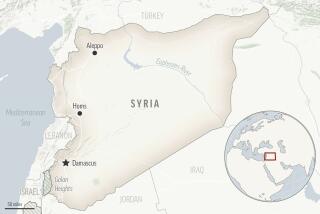French military says death of Al Qaeda leader in Mali ‘probable’

- Share via
PARIS — French military officials said Monday night that it was “probable” that Abou Zeid, one of the leaders of Al Qaeda in North Africa, had been killed.
However, the fate of another Islamic extremist leader, Mokhtar Belmokhtar, remained unknown, despite reports that he had been killed by troops from Chad last week.
A member of a militant group said on a website that Zeid, an Algerian known as the “Emir of the Sahara,” had been killed by “a French airstrike in the Ifoghas mountains” in northern Mali, where French and local soldiers have been trying to drive out militant Islamists since January.
The same site said Belmokhtar, the mastermind behind the assault and hostage-taking at a gas facility in northern Algeria in January, had not been killed.
“He is alive, alive and well,” said the unidentified source, who also said Belmokhtar would make a statement in the “next few days.”
Zeid headed Al Qaeda in the Islamic Maghreb. President Idriss Deby of Chad, whose forces are fighting alongside the French in northern Mali, announced that Zeid had been killed. Adm. Edouard Guillaud, chief of staff for the French military, said only that his death was “probable.”
“We cannot be certain for the moment, because we haven’t recovered the body,” Guillaud said. “But it would be good news.”
The French-language news website Sahara Medias, based in Mauritania, said Zeid’s death had been confirmed by one of its journalists investigating the French airstrikes.
Mohamed Sneba, editor of Sahara Medias, told French radio station RFI that there was a “very strong probability” that Zeid had died “at a place near Taraghrarit, not far from the Algerian border.”
Sneba said analysts were interested to know where the infamous “Zeid treasure,” said to consist of ransom payments, was. “We’re told that this treasure is essentially lost because he [Zeid] hid it in the desert and was the only one to know where it was hidden,” he said.
Willsher is a special correspondent.
More to Read
Sign up for Essential California
The most important California stories and recommendations in your inbox every morning.
You may occasionally receive promotional content from the Los Angeles Times.













